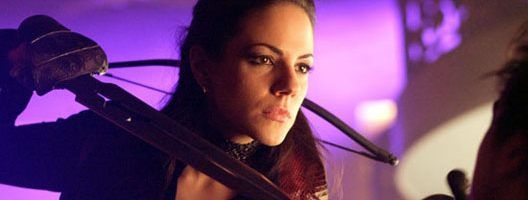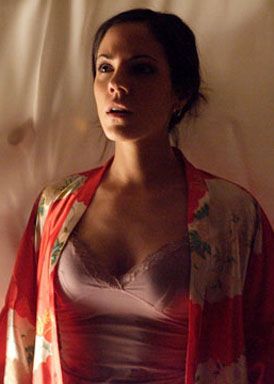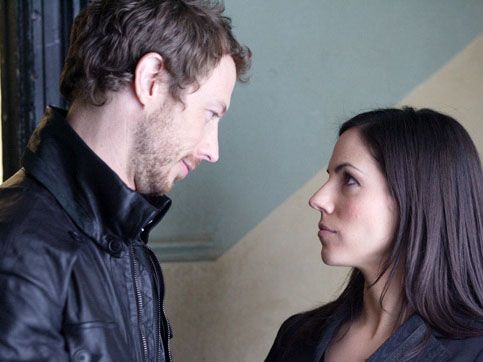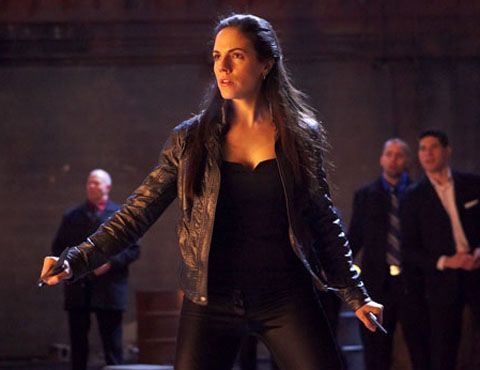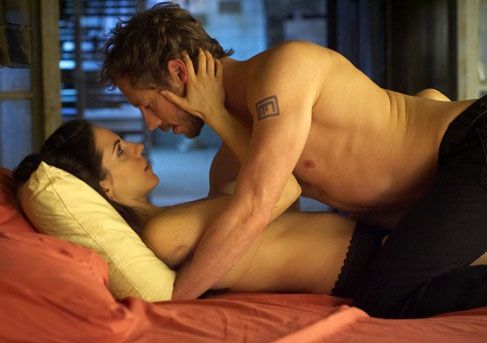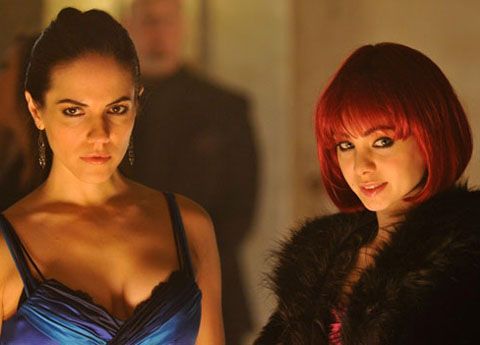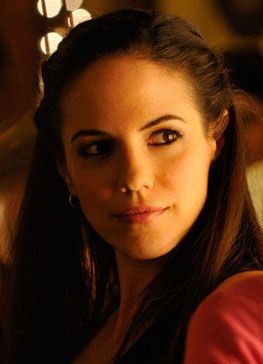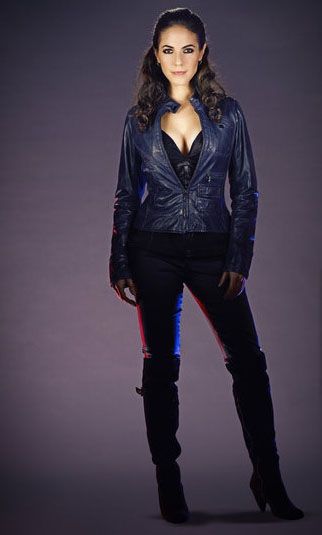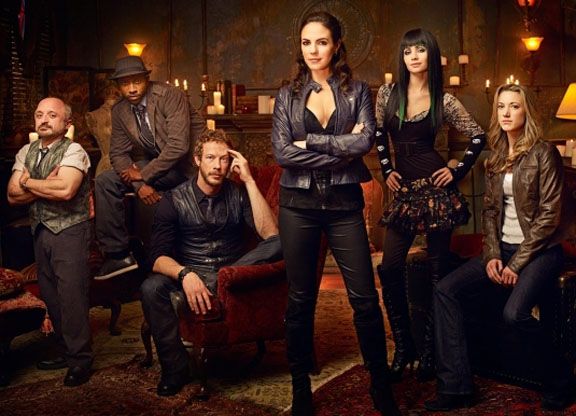The drama series Lost Girl, premiering on Syfy January 16th, follows supernatural seductress Bo (Anna Silk), a Succubus who feeds on the sexual energy of humans. Having grown up with human parents, Bo discovers that she is one of the Fae – creatures of legend and folklore – who pass as humans while secretly feeding off them. Embarking on a personal mission to unlock the secrets of her origin, Bo decides to help humans and Fae solve mysteries and right wrongs, with the help of her human sidekick Kenzi (Ksenia Solo), and Fae police detective Dyson (Kris Holden-Ried).
During this recent exclusive phone interview with Collider, show star Anna Silk talked about what attracted her to this story and character, that she’s hoping U.S. audiences embrace the show the way that audiences have around the world, the challenges of being the lead of a series, how much fun she has exploring the sexual side of her character, that she loves meeting the show’s loyal fans, and that she hopes to continue playing strong, complex women. Check out what she had to say after the jump:
Question: What was it that initially attracted you to this show and the character of Bo? Was there something that really sold you on the concept, as far as the direction it would be taking?
ANNA SILK: Yes. When you first get an audition, you just get a description of the show and the character, and the scenes that you’ll be auditioning with. They’ll usually give you the script too, if you’re auditioning for a lead role. At first, I just got what the show was about and it said, “Bo is a bisexual Succubus who needs sex to heal.” I was like, “Oh, my god!,” and my husband was like, “Was this written by a fratboy? What is this?” And then, I got the script and I read it. It was created by Michelle Lovretta, who’s incredible, and now it’s been really pioneered by Jay Firestone, and they both have this great vision for the show.
In the original script, I loved that this character of Bo was not just this sexual creature that feeds on energy. She was really thrown into this world. She grew up thinking she was human, and now, suddenly, she’s part of this whole Fae underworld, and she’s a Succubus, and all of these questions have to be answered. I loved that she was really this fish-out-of-water, that she was so vulnerable, that she was so scared, and that her power was really her greatest source of shame. That, alone, had a lot of interest for me because I knew that there was room for growth in that. She wasn’t just this tough, kick-ass character. Her strength really came from the fact that she was so vulnerable. That really stood out, on the page, when I read the initial pilot.
Our initial pilot actually airs as Episode 8, in the first season. That’s kind of crazy! And when you see it, it’s not so different because it fits into the story, but we all look a little different. We all are very dark and very serious because that was the tone of the show. And then, we introduced some lighter elements to it, which I think makes it work. Over the season, we found a nice balance of finding levity in that darkness, but we like that darkness as well. It’s definitely evolved, over the first season and into the second season. I liked that Bo was not just this sci-fi sex creature, which is what it first appeared to be. Every time we got a new script, it would be like, “Wow, okay, that’s pretty cool.” And the guest star roles on our show are so great. People get to come on and they’re really excited to be on the show and get to play either a Fae creature or some bad-ass human. It’s cool. What’s special about Lost Girl is that it covers that folklore and mythology in such a rich way. Every minute of the episodes, we’re learning something new about the world that they’re living in.
How weird is it that viewers in the States are just now going to be starting with the show, when you’ve already aired two seasons in Canada and have been picked up for Season 3? Does it feel like Season 1 is really far away, or does it all feel like part of one journey?
SILK: It feels far away, I have to be honest. It’s weird because the show has grown so much, in the second season. I’m not saying that, as in it’s better in the second season. It really has evolved. It grew in exactly the right way. And now, we’re starting a third, in the Spring. For me, it feels strange to talk about Season 1 because there’s more going on in my brain now, but we had a great first season and that’s where we first garnered our audience. I think that’s it’s a really unique show that has a unique voice, and I hope that U.S. audiences really embrace it as well.
Is it reassuring to know that SyFy is pairing Lost Girl with Season 2 of Being Human, which already has a devoted following?
SILK: I think so, yeah. That’s always a really good thing, and I think it’s a really good pair. Lost Girl is very popular in Canada, but we’ve also been popular all over the world, which has been crazy. I hope that U.S. audiences embrace it the same way that Canadian audiences and people around the world have. But, it’s always reassuring to know that you’re paired up with another really great show.
Are you normally a fan of the sci-fi genre, or was this totally new to you?
SILK: I was a fan. I was a big fan of Buffy, which we’ve been compared to a few times. I love that because I think some of the humor is definitely similar and I take it as a compliment. I had a book that was given to me, as a kid, that was called Faeries. It was this dark, sinister book with pictures that used to scare me because they were these creepy little creatures. But, I was always really drawn to that fantasy world, more than a sci-fi world, in terms of outer space stuff. I think it’s so cool. The other thing that has drawn people to our show, and I hope draws U.S. audiences as well, is that the central relationships on the show are what makes it so unique and so strong. I love the fact that we get to experience these relationships in this crazy world of the Fae because it gives us so much growth. We can do anything. It’s so broad. We can take it to that next level, and then there’s another level after that, which is cool.
How was it to transition to being the lead of a show? Was that challenging, or was that something you felt really ready for?
SILK: Both. I definitely felt like I was ready for it, but I definitely learned a lot, in the first season. In terms of what it means to be the lead of a show, I definitely learned what that means and how to pace yourself. I’m really blessed that I have this job of getting to tell a story over an entire season. And in Canada, our second season is 22 episodes, so it was an even longer season. So, I definitely learned a lot about how to pace yourself, as an actor, so that you can perform at your best. That’s something you have to learn. No one can tell you how to do that. You really have to experience it and have moments where you go, “Oh, my god, I don’t know if I can do this!,” and then figure your way out. So, even though the second season was a longer season and just grueling, in terms of the hours, it was an easier season for me, as an actor.
What is your typical process for getting into a character, and is that different when you’re playing someone supernatural?
SILK: I think that, for playing Bo, I never thought of it as playing someone supernatural. There’s a big human side to Bo. In fact, the biggest side of Bo is probably human. The Succubus side of Bo is something that’s growing, and it definitely becomes a bigger part of who she is, later on. I was really lucky because, since Bo starts out so new to this world and kind of naive, as the actor, I got to grow along with her and learn a lot with her about this world. I’m really learning as the audience learns, especially in the first season. That was a gift because I got to experience it in a very real way.
How would you describe the relationship between Bo and Dyson (Kris Holden-Ried)?
SILK: Bo has never, ever been in a relationship, at that point, because anyone that she gets into a relationship with, it’s a momentary relationship and they wind up dead. So, she’s really new, when it comes to relationships. She’s kind of a teenager. It’s like she’s 15 and she has her first boyfriend, and she’s getting jealous and not really considering his feelings. I think Bo and Dyson have an instant connection, and the way that Kris plays Dyson is with so much intensity and quiet knowledge. He knows a lot that Bo does not know, and he knows a lot about Bo, but that’s something that comes out, over the first season. That relationship was really very intense.
What’s it been like to work with Kris Holden-Ried and develop the relationships between your characters?
SILK: Kris is great! The real Kris is much goofier than Dyson is. Kris is really energetic and bounces around a lot, and Dyson is a little bit more subdued than that. Kris and I really like each other. We really respect each other. We really do have different ways of working, as actors, and it’s funny because, in the first season, any frustration you see with Bo, may have been real frustration, in finding that relationship. It worked so well because that’s how it should have been. Kris and I really like each other a lot. We really care about each other, and we care about that relationship. It was a pretty raw, real relationship. Dyson can just sit there and look at Bo while she’s wondering what he could possibly be thinking about, and Bo really can’t let anything just sit and be quiet about it. She needs to know exactly what he’s thinking, and that’s where the teenaged side of Bo comes out, when it comes to relationships.
As a Succubus, Bo is a character that doesn’t differentiate between genders when it comes to who she’s attracted to. Is it fun to play a character who’s so free and open with her sexuality?
SILK: Yeah. In terms of the relationship with Lauren, played by Zoie Palmer, that relationship is just as real and just as important to Bo, as her relationship with Dyson. That’s something that we are really happy about on the show because it’s never brought up. No one calls her a bisexual Succubus. Sometimes the media does, but on the show, they certainly don’t. We never talk about the fact that Lauren is female. The only thing we talk about is that Lauren is human. That’s a problem. I just think it’s a really unique part of the character, and it’s fun to play. Who wouldn’t want to be this sexual creature that can entice people so easily?
How has this entire ensemble of actors been to work with? Was there a moment when you guys really felt things start to come together?
SILK: Yeah, at the beginning of Season 2. We certainly felt things come together in the first season, but the first season is a challenge, in trying to figure out what these relationships are. Everyone was on board and everyone loves their own character so much, which is great. But, there was a moment, early in Season 2, the six main cast were sitting around doing a scene, and we finished and I looked at everyone and was like, “This feels like we’re a family.” When you get together with a family, everyone knows when to come in and say whatever, and someone makes a joke and we all laugh, and someone else makes us grouchy. It had a real rhythm to it. We’ve really grown into this, which is how it should happen. We technically all just met, in the beginning of the first season. I knew some of the actors for years, but as these characters, we had just met. I think it’s really cool, and we’ve really found some nice chemistry. The cast is such an interesting group of people that might not typically be in these roles.
With all of the different layers of the show – with the supernatural aspect, the romance and the crime drama – is there something that you enjoy most about playing Bo, and is any of it particularly challenging?
SILK: I love Bo because she’s so scared, a lot of the time, but she has to be strong and stand up for what she believes in, and she does. She has such a fierce loyalty to her friends and this makeshift family that she has, in this world. I love her loyalty, her determination, her strong sense of justice and right and wrong, and that she’s so stubborn, in her beliefs. The human side of her is really good, but there could be darkness in there as well, and I like that she doesn’t know what could be bubbling, right below the surface. It really fun to play that kind of character. And, I think the whole thing is challenging. This is Bo’s journey through this world, so I definitely feel a responsibility to tell that story. The characters that she meets, along the way, and the people that she’s with on the show, on a daily basis, are the ones that enrich that world. It’s always challenging, but it’s always the best challenging. How great is it that, in every episode, I get to do something so weird and so completely different? She’s done sword fighting, been underwater and has lost her memory. So many things happen, and it’s really fun.
Do you enjoy doing this type of physical work, and is it challenging to make sure that your wardrobe can adapt to the action you have to do?
SILK: Yes, I love it. It’s very much who Bo is and I feel like it just brings me closer to the character. I’ve always been a physical actor and a physical person, so I like doing it. I like doing as much of it as I can, myself, and I do most of it myself. I have a kick-ass stunt double as well, who’s awesome, but I love doing it. Now, I’ve learned that, when I try on wardrobe, I have to pretend to throw a sword around, and crouch down and jump around in it, just to make sure it’s going to be able to move with me. I had a few instances, in the first season, where I was like, “Wait, I can’t lift my arm!” If I was really going to go out and kick Fae butt, I’d be wearing work boots and gym clothes, which really doesn’t look quite the same.
What do you think of the fan response for the show? Are you surprised that you’ve been able to attract such a variety of fans, with the sci-fi audience, the crime drama audience and the gay audience?
SILK: I know. We’ve gone to Fan Expo, which happens in Toronto, and we’ve gone to Comic-Con, this past year, which was really cool. We had a pretty good response at Comic-Con, considering that we’d never aired in the U.S. People were really excited. What I love is that, all the fans I meet at conventions, and on a daily basis in Toronto when I’m out, are all so completely different. They come from all different backgrounds. We have a lot of young women who love the show. We have a lot of people from the lesbian community that love the show. I meet people from a more mature age group who watch it. Someone said, “Oh, my grandfather loves your show,” and I was like, “Really?!” I just think it’s so cool. To go to those events and hear people screaming for these characters, when we walk into the room, and be so excited and have really smart questions is just really cool. Everyone has really embraced the show. We have a really active and vocal audience. They say what they like and they say what they don’t like, and I like that. I like that people aren’t just like, “Yeah, it’s a good show.” They say, “But, I don’t like this,” or “I really love this.” I think that Bo is a good role model. I’ve learned a lot from her.
When you work so hard on a show like this, do you look forward to taking a vacation between seasons, or do you look for other work to do?
SILK: I look forward to the breaks. I’ll have about two and a half months off, before Season 3 starts. Breaks are good because you need breaks to be more creative. It’s hard to come up with that creativity and the stamina for that creativity, all the time. It really is a long schedule and it’s pretty grueling, so taking those breaks is really important. Doing something completely different than acting for awhile is really important. I will still have my butt in a class, when I get back to L.A. I have a great acting class that I take once a week, and I love my teacher and will still be there. I love it. I’ve always taken classes. I always stay involved like that. But, in terms of work, it would have to be something that really interests me a lot and maybe was completely different. Otherwise, I think I would just burn myself out. You want to come back strong. It really just depends, but I do think breaks are important.
Is there a type of role or a genre that you’d love to do, but haven’t had the opportunity to do yet?
SILK: Well, this role is certainly a dream. I get to play the lead of something that’s so unique, and I get to do such a variety of things. I was a huge fan of Alias. I’m a huge fan of The Closer. I really like Prime Suspect. I love female-driven drama, and those kinds of characters. I really love complex women. When I started in the business, years ago, people would always say, “You better get as much work as you can now because, once you get over 40, it’s over.” I don’t see that with TV. Maybe it’s because I am getting older, but the kinds of roles I’m drawn to are more mature roles. There’s a more mature woman on the horizon, in television, and I think that’s cool. I definitely would want to continue to play roles like Bo, where it’s just a more complex character.

